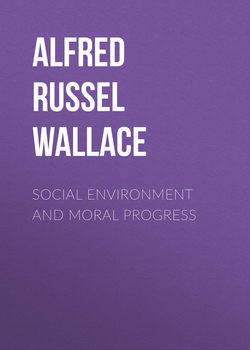Читать книгу Social Environment and Moral Progress - Alfred Russel Wallace, Alfred Russel Wallace - Страница 6
PART I.—HISTORICAL
CHAPTER VI
SAVAGES NOT MORALLY INFERIOR TO CIVILISED RACES
ОглавлениеIf the facts and arguments set forth in the preceding chapters are correct we should not expect to find any living examples of the unspiritualised man, since the assumption is that the whole race received the influx which started them on their course of purely human development within a strictly limited period, perhaps of a very few generations or even one generation. The ancestral form—the supposed missing link—would then have become extinct.
If this were not so we should expect to find some isolated groups of speechless man, and of this there is no example; but, on the contrary, the very lowest of existing races are found to possess languages which are often of extreme complexity in grammatical structure and in no way suggestive of the primitive man-animal of which they are supposed to be surviving relics. So long as we got our knowledge respecting them from the low-class Europeans who captured them for slaves or shot them down as wild beasts, we could not possibly acquire any real knowledge of them as human beings. But now that we have more trustworthy accounts of them by intelligent travellers or missionaries, we find ample evidence that when by kindness and sympathy we penetrate to their inner nature, we discover that they possess human qualities of the same kind as our own. A few examples of what unprejudiced witnesses say of them will be very instructive.
Darwin, after attending a meeting between Captain Fitzroy and the chief of a small island near Tahiti to settle a question of compensation for injury to an English ship, says: "I cannot sufficiently express our surprise at the extreme good sense, the reasoning powers, moderation, candour, and prompt resolution which were displayed on all sides."
Captain Cook himself, who saw them in their primitive condition, speaks of the natives of the Friendly Isles as being "liberal, brave, open and candid, without either suspicion or treachery, cruelty, or revenge"; and a century later Admiral Erskine remarks that "they carry their habits of cleanliness and decency to a higher point than the most civilised nations"; while all the Polynesian races are kind and attentive to the sick and aged, and unlimited hospitality is everywhere practised by them.
Even the Australian aborigines, who are often said to be one of the lowest of human races, are found to possess many good qualities by those who know them best. Mr. Curr, who was for forty years protector of the aborigines in Victoria, says:
"Socially, the black is polite, gay, fond of laughter, and has much bonhomie in his composition. . . . The natives are very strict in obeying their laws and customs, even under great temptation. The horror of marrying a woman within the prohibited degrees of relationship, the extreme grief they manifest at the death of children or relatives, and sometimes even for white men, as illustrated by the native boy who was the sole companion of the unfortunate Kennedy when he was murdered, are sufficient to indicate that they possess affections and a sense of right and wrong not very different from our own."
The fact that the physical characteristics of the Australians are substantially those of the Caucasian race in its lowest types has led me to conclude that these interesting people may have been descended from much more civilised remote ancestors, and are thus an example of degradation rather than of survival.2
Many other illustrations of both intelligence and morality are met with among savage races in all parts of the world; and these, taken as a whole, show a substantial identity of human character, both moral and emotional, with no marked superiority in any race or country. In intellect, where the greatest advance is supposed to have occurred, this may be wholly due to the cumulative effect of successive acquisitions of knowledge handed down from age to age. Euclid and Archimedes were probably the equals of any of our greatest mathematicians of to-day, while the architecture of Greece, of India, and of Central America is little inferior to mediæval Gothic. But none of these, though so different in style, can be said to prove any real advance in intellectual power from that of the builders of the much more ancient temples and pyramids of Egypt. This latter country, too, in its high material civilisation and its remarkable religious system, shows itself the equal of any that has succeeded it.
2
See my Australia and New Zealand, Chap. V., "The Australian Aborigines," where this view was first set forth. (Stanford, 1893.) For cases of morality among savages see my Natural Selection and Tropical Nature, pp. 199-201.
